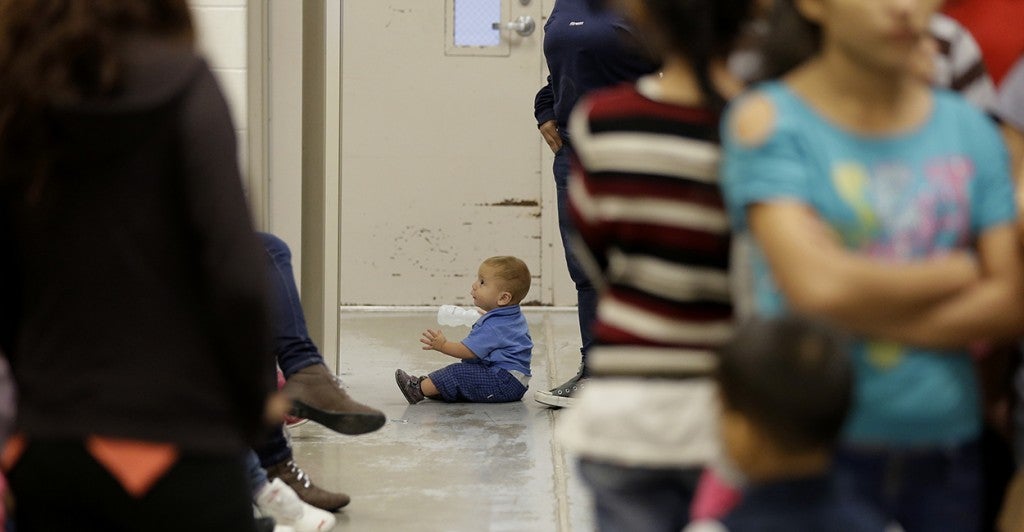As lawmakers debate how to handle the surge of immigrants crossing the country’s southern border, unaccompanied minors denied asylum face a long road back home.
Because of the backlogged U.S. immigration system, many of those children remain in the country for years—even if deportation is the only option.
According to information obtained by the House Judiciary Committee from U.S. Citizenship and Immigration Services, 35 percent of unaccompanied minors’ asylum applications have been immediately denied by asylum officers so far this year.
For many, an initial denial by an officer can lead to years of waiting to appear before an immigration judge, said Jessica Vaughan, director of policy studies for the Center for Immigration Studies. She told The Daily Signal:
There’s definitely an incentive to go through the asylum process because you get to stay here for a long period of time with a de facto legal status, and you might even have your claim approved. … There’s not much to lose.
More than 52,000 unaccompanied minors crossing the Rio Grande into Texas have been seized by Border Patrol agents since October.
How the Process Works
After undergoing an initial screening, they are transferred to the care of the Department of Health and Human Services and sent to processing centers within 72 hours of their apprehension, as required under the 2008 William Wilberforce Trafficking Victims Protection Reauthorization Act.
Unaccompanied minors then meet with an asylum officer. In that meeting, officers determine whether the young illegal immigrant can remain in the United States.
If an asylum officer believes an unaccompanied minor can pass the credible fear test—determining if they would face persecution or torture back home—the immigrant is eligible for asylum. But if the officer does not believe the young immigrant meets the requirements for credible fear, they can appear before an immigration judge.
In a border state like Arizona, illegal immigrants requesting to see an immigration judge may wait as long as seven years before appearing in court, Vaughan said. In other states, the wait for young illegal immigrants both claiming and not claiming asylum is approximately four years.
In a statement to The Daily Signal, House Judiciary Chairman Bob Goodlatte, R-Virginia, pointed to the exhaustive asylum process and noted that unaccompanied minors are able to remain in the United States while waiting to go to immigration court. He said:
If an unaccompanied alien minor’s asylum application is denied by an asylum officer, they can try and try again. When an asylum officer does not approve the application, it is then referred to an immigration judge where the applicant can make his or her claim again. If that fails, they can continue to appeal their case. This process takes several years, and while the process is pending, these individuals are released into the interior of the United States.
If an unaccompanied minor’s plea for asylum is approved by an immigration judge, he or she can apply for a green card within a year and receive legal status. But for those who do not fare as well, an issue of removal is ordered. It is then up to U.S. Immigration and Customs Enforcement, a division of the Department of Homeland Security, to follow through with the order.
According to Vaughan and Goodlatte, an illegal immigrant can also appeal the immigration judge’s decision.
Ordered to Leave But Staying Put
Though unaccompanied minors and illegal immigrants are moving through the immigration system once arriving in the United States—albeit slowly, Vaughan said—ICE is “not committed” to enforcing removal orders. She continued:
Any asylum seeker whose claim is denied, whether they’re an unaccompanied minor or adult or family, if their claim is denied, ICE is not committed to looking for them. No one is coming to look for them or attempting to make them depart. It’s an honor system—it’s the law, not the policy.
According to a March report from the Center for Immigration studies, 870,000 illegal immigrants have been issued orders of removal but remain in the country.
That number, Vaughan noted, will likely grow as a result of the influx of unaccompanied minors crossing the border now.
In a letter sent to Congress last month, President Obama made a request to have the 2008 trafficking law changed to allow Border Patrol agents to decide whether or not unaccompanied minors apprehended should be deported. The goal of the change, the White House said, is to speed up the deportation decision-making process and resolve the slow immigration cases more speedily.
But the president backtracked on changing the trafficking law and instead asked Congress to authorize $3.7 billion in emergency funds to boost spending on Border Patrol agents, immigration judges and aerial surveillance.
White House spokesman Josh Earnest said last week the administration supports legislation speeding up the deportation process for those crossing the border, but said it’s important their rights are protected.
Similarly, immigration lawyers fear that changes to the 2008 trafficking law would hurt unaccompanied minors. In an interview with USA Today, Ruthie Epstein, a policy analyst at the ACLU, said, “It’s an utter devastation of due process for our most vulnerable community members.”
